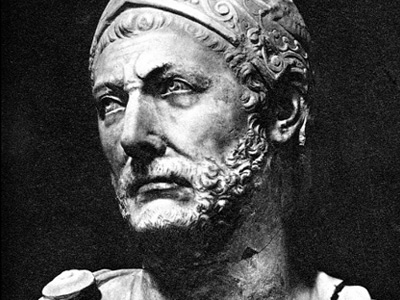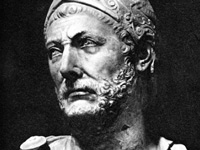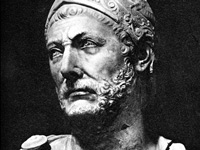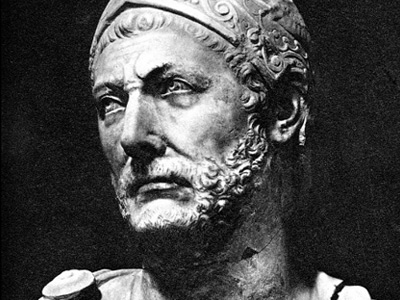Hannibal Barca (247-183 BC)

Background and Early Career
Hannibal was one of the sons of Hamilcar Barca, a Carthaginian leader. He was born in what is present day Tunisia. He had several sisters and two brothers, Hasdrubal and Mago. His brothers-in-law were Hasdrubal the Fair and the Numidian king Naravas. He was still a child when his sisters married, and his brothers-in-law were close associates during his father's struggles in the Mercenary War and the Punic conquest of the Iberian Peninsula. In light of Hamilcar Barca's cognomen, historians refer to Hamilcar's family as the Barcids. However, there is debate as to whether the cognomen Barca (meaning "thunderbolt") was applied to Hamilcar alone or was hereditary within his family. If the latter, then Hannibal Hannibal Barca (247-183 BC), was a Carthaginian general, considered one of the greatest military commanders in history. Hannibal lived during a period of great tension in the western Mediterranean Basin, when the Roman Republic established its supremacy over other great powers such as ancient Carthage. One of his most famous achievements was at the outbreak of the Second Punic War, when he marched an army which included war elephants from Iberia over the Pyrenees and the Alps into Italy. Hannibal Barca » and his brothers also bore the name "Barca".
Hannibal Barca (247-183 BC), was a Carthaginian general, considered one of the greatest military commanders in history. Hannibal lived during a period of great tension in the western Mediterranean Basin, when the Roman Republic established its supremacy over other great powers such as ancient Carthage. One of his most famous achievements was at the outbreak of the Second Punic War, when he marched an army which included war elephants from Iberia over the Pyrenees and the Alps into Italy. Hannibal Barca » and his brothers also bore the name "Barca".
After Carthage's defeat in the First Punic War, Hamilcar set out to improve his family's and Carthage's fortunes. With that in mind and supported by Gades, Hamilcar began the subjugation of the tribes of the Iberian Peninsula. Carthage at the time was in such a poor state that its navy was unable to transport his army; instead, Hamilcar had to march it towards the Pillars of Hercules and then cross the Strait of Gibraltar.
According to Polybius, Hannibal much later said that when he came upon his father and begged to go with him, Hamilcar agreed and demanded that he swear that as long as he lived he would never be a friend of Rome. There is even an account of him at a very young age (9 years old) begging his father to take him to an overseas war. In the story, Hannibal's father took him up and brought him to a sacrificial chamber. Hamilcar held Hannibal over the fire roaring in the chamber and made him swear that he would never be a friend of Rome. Other sources report that Hannibal told his father, "I swear so soon as age will permit...I will use fire and steel to arrest the destiny of Rome." According to the tradition, Hannibal's oath took place in the town of Peñíscola, today part of the Valencian Community, Spain.
Hannibal's father went about the conquest of Hispania. When his father drowned in battle, Hannibal's brother-in-law Hasdrubal the Fair succeeded to his command of the army with Hannibal (then 18 years old) serving as an officer under him. Hasdrubal pursued a policy of consolidation of Carthage's Iberian interests, even signing a treaty with Rome whereby Carthage would not expand north of the Ebro so long as Rome did not expand south of it. Hasdrubal also endeavoured to consolidate Carthaginian power through diplomatic relationships with native tribes.
Upon the assassination of Hasdrubal in 221 BC, Hannibal (now 26 years old) was proclaimed commander-in-chief by the army and confirmed in his appointment by the Carthaginian government. Livy, a Roman The Roman Republic was a form of government of Rome and the era of the classical Roman civilization when it was run through public representation of the Roman people. Beginning with the overthrow of the Roman Kingdom (traditionally dated to 509 BC) and ending in 27 BC with the establishment of the Roman Empire, Rome's control rapidly expanded during this period - from the city's immediate surroundings to hegemony over the entire Mediterranean world. scholar, gives a depiction of the young Carthaginian: "No sooner had he arrived...the old soldiers fancied they saw Hamilcar in his youth given back to them; the same bright look; the same fire in his eye, the same trick of countenance and features. Never was one and the same spirit more skillful to meet opposition, to obey, or to command."
The Roman Republic was a form of government of Rome and the era of the classical Roman civilization when it was run through public representation of the Roman people. Beginning with the overthrow of the Roman Kingdom (traditionally dated to 509 BC) and ending in 27 BC with the establishment of the Roman Empire, Rome's control rapidly expanded during this period - from the city's immediate surroundings to hegemony over the entire Mediterranean world. scholar, gives a depiction of the young Carthaginian: "No sooner had he arrived...the old soldiers fancied they saw Hamilcar in his youth given back to them; the same bright look; the same fire in his eye, the same trick of countenance and features. Never was one and the same spirit more skillful to meet opposition, to obey, or to command."
After he assumed command, Hannibal spent two years consolidating his holdings and completing the conquest of Hispania, south of the Ebro. In his first campaign, Hannibal attacked and stormed the Olcades' strongest centre, Alithia, which promptly led to their surrender, and brought Punic power close to the River Tagus. His following campaign in 220 BC was against the Vaccaei to the west, where he stormed the Vaccaen strongholds of Helmantice and Arbucala. On his return home, laden with many spoils, a coalition of Spanish tribes, led by the Carpetani, attacked, and Hannibal won his first major battlefield success and showed off his tactical skills at the battle of the River Tagus. However, Rome, fearing the growing strength of Hannibal in Iberia, made an alliance with the city of Saguntum, which lay a considerable distance south of the River Ebro and claimed the city as its protectorate. Hannibal not only perceived this as a breach of the treaty signed with Hasdrubal, but as he was already planning an attack on Rome, this was his way to start the war. So he laid siege to the city, which fell after eight months. Rome reacted to this apparent violation of the treaty and demanded justice from Carthage. In view of Hannibal's great popularity, the Carthaginian government did not repudiate Hannibal's actions, and the war he sought was declared at the end of the year. Hannibal was now determined to carry the war into the heart of Italy by a rapid march through Hispania and southern Gaul.
HISTORY

RESOURCES
This article uses material from the Wikipedia article "Hannibal Barca (247-183 BC)", which is released under the Creative Commons Attribution-Share-Alike License 3.0.
© Stories Preschool. All Rights Reserved.









